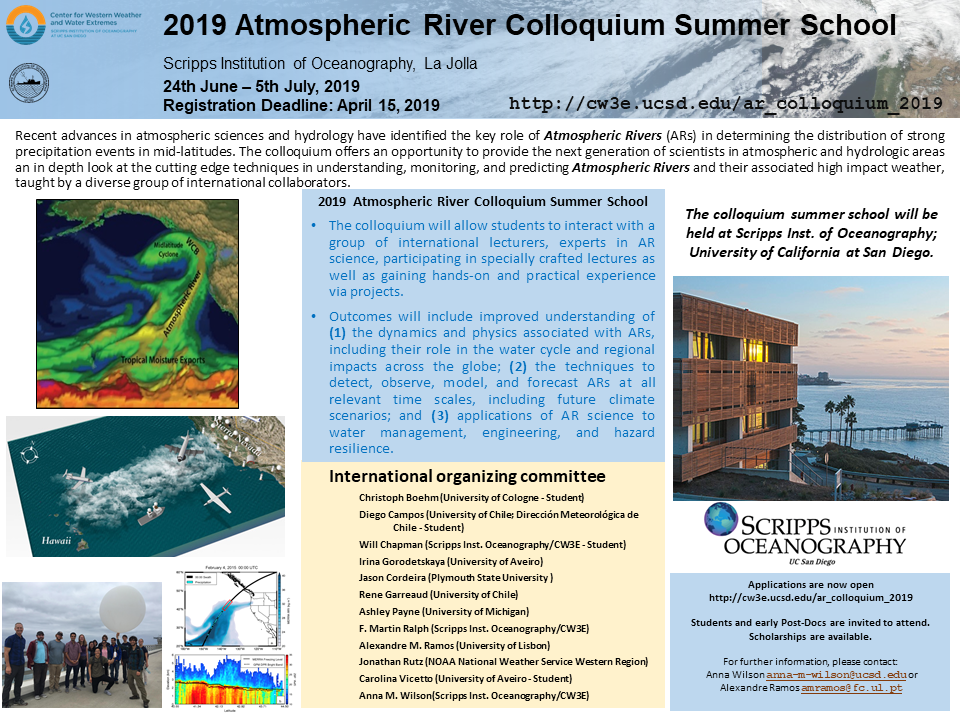Atmospheric Rivers Colloquium Summer School
Scripps Institution of Oceanography, La Jolla, California
24 June – 5 July 2019
 Colloquium Goal: The overarching goal of the colloquium is to provide the next generation of atmospheric scientists with an in depth look at the cutting edge techniques in understanding, monitoring, and predicting atmospheric rivers (ARs) and their associated high-impact weather, using the AR monograph that is in preparation as a framework. To achieve this goal, the colloquium will bring a diverse group of students together, at different stages in their education and with experience in various disciplines relevant to ARs, to learn from an international group of scientists studying ARs. The colloquium agenda will allow students to interact with these leaders in AR science, gaining hands-on experience as well as participating in specially crafted lecture sessions. Outcomes for participants will include improved understanding of (1) the fundamental dynamics and physics associated with ARs, including their role in the water cycle and impacts in different regions across the globe; (2) the techniques to detect, observe, model, and forecast ARs at all relevant time scales, including in future climate scenarios; and (3) applications of AR science to water management, engineering, and hazard resilience.
Colloquium Goal: The overarching goal of the colloquium is to provide the next generation of atmospheric scientists with an in depth look at the cutting edge techniques in understanding, monitoring, and predicting atmospheric rivers (ARs) and their associated high-impact weather, using the AR monograph that is in preparation as a framework. To achieve this goal, the colloquium will bring a diverse group of students together, at different stages in their education and with experience in various disciplines relevant to ARs, to learn from an international group of scientists studying ARs. The colloquium agenda will allow students to interact with these leaders in AR science, gaining hands-on experience as well as participating in specially crafted lecture sessions. Outcomes for participants will include improved understanding of (1) the fundamental dynamics and physics associated with ARs, including their role in the water cycle and impacts in different regions across the globe; (2) the techniques to detect, observe, model, and forecast ARs at all relevant time scales, including in future climate scenarios; and (3) applications of AR science to water management, engineering, and hazard resilience.
Steering Committee: The steering committee that is organizing the colloquium is composed of an international group of instructors and student representatives. The steering committee solicited input from students who attended the 2nd International Atmospheric Rivers Conference (IARC) and the Student Forecasting Workshop that followed. The steering committee members are listed at the end of this document.
Colloquium Details: The colloquium will be held from 24 June to 5 July 2019 in the Martin Johnson House at the Scripps Institution of Oceanography in La Jolla, California (see map below). The Center for Western Weather and Water Extremes (CW3E) will coordinate and host 20-30 students and 10-15 instructors to participate in the colloquium. Because the colloquium aims to provide a better understanding of ARs in all areas of the world (e.g., west coasts of continents, polar regions, and regions affected by inland penetration), students will be recruited to apply from throughout the globe, starting with the multiple international students who have attended the IARC. Confirmed instructors also come from three continents (North America, South America, and Europe) and include an expert on ARs in polar regions. In order to leverage the upcoming publication of the first textbook focused entirely on ARs, lead or co-authors on AR monograph chapters will serve as colloquium instructors. The structure of each day of the colloquium will contain expert-led classroom lectures and hands on exercises, with students participating in a small-group targeted project with the goal of advancing the current science. The first 15 students to register will have their travel, lodging, and food costs funded by the colloquium summer school through sponsoring grants.
Steering Committee Members:
Christoph Boehm (student member), University of Cologne
Diego Campos (student member), University of Chile; Dirección Meteorológica de Chile
Will Chapman (student member), Center for Western Weather and Water Extremes, UC San Diego
Dr. Jason Cordeira, Plymouth State University
Dr. Rene Garreaud, University of Chile
Dr. Irina Gorodetskaya, University of Aveiro
Dr. Ashley Payne, University of Michigan
Dr. F. Martin Ralph, Center for Western Weather and Water Extremes, UC San Diego
Dr. Alexandre Ramos, University of Lisbon
Dr. Jonathan J. Rutz, NOAA National Weather Service Western Region
Carolina Viceto (student member), University of Aveiro
Dr. Anna M. Wilson, Center for Western Weather and Water Extremes, UC San Diego
Topics and Instructors:
|
AR Definition |
|
|
Tracking of ARs |
|
|
AR Recon and Observations |
Dr. David Lavers, Dr. F. Martin Ralph, Dr. Anna M. Wilson, and Dr. Irina Gorodetskaya |
|
Hydrology |
|
|
Climate (past) |
Dr. Ashley Payne, Dr. Jonathan J. Rutz, and Larry Schick |
|
Forecast (14 days) |
|
|
Polar/Telecommunications |
|
|
Impacts |
Dr. Jonathan J. Rutz, Dr. Alexandre Ramos, and Dr. Rene Garreaud |
|
Isotopes and Lagrangian |
|
|
Atmospheric Dynamics |
|
|
WRF Modeling |
|
|
Subseasonal to Seasonal |
Dr. Duane Waliser and Jeanine Jones |
|
Operations and Engineering |
Jeanine Jones, Dr. F. Martin Ralph, and Larry Schick |
|
Aerosols and Chemistry |
|
|
Climate (present) |
|
|
Climate (future) |
